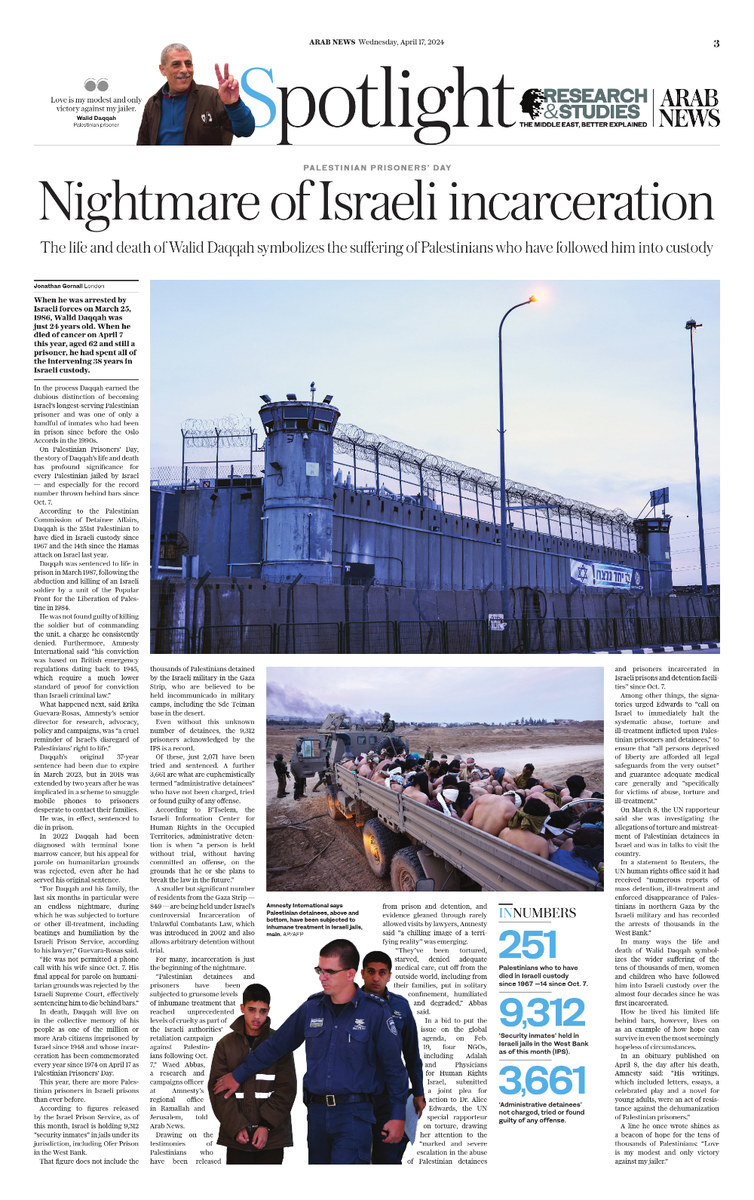LONDON: When he was arrested by Israeli forces on March 25, 1986, Walid Daqqah was just 24 years old. When he died of cancer on April 7 this year, aged 62 and still a prisoner, he had spent all of the intervening 38 years in Israeli custody.
In the process Daqqah earned the dubious distinction of becoming Israel’s longest-serving Palestinian prisoner and was one of only a handful of inmates who had been in prison since before the Oslo Accords in the 1990s.
On Palestinian Prisoners’ Day, the story of Daqqah’s life and death has profound significance for every Palestinian jailed by Israel — and especially for the record number thrown behind bars since Oct. 7.
According to the Palestinian Commission of Detainee Affairs, Daqqah is the 251st Palestinian to have died in Israeli custody since 1967 and the 14th since the Hamas attack on Israel last year.
Daqqah was sentenced to life in prison in March 1987, following the abduction and killing of an Israeli soldier by a unit of the Popular Front for the Liberation of Palestine in 1984.

A freed prisoner waves from a bus during a welcome ceremony following the release of Palestinian prisoners from Israeli jails in exchange for Israeli hostages held in Gaza by Hamas last year. (AFP)
He was not found guilty of killing the soldier but of commanding the unit, a charge he consistently denied. Furthermore, Amnesty International said “his conviction was based on British emergency regulations dating back to 1945, which require a much lower standard of proof for conviction than Israeli criminal law.”
What happened next, said Erika Guevara-Rosas, Amnesty’s senior director for research, advocacy, policy and campaigns, was “a cruel reminder of Israel’s disregard of Palestinians’ right to life.”
Daqqah’s original 37-year sentence had been due to expire in March 2023, but in 2018 was extended by two years after he was implicated in a scheme to smuggle mobile phones to prisoners desperate to contact their families.
He was, in effect, sentenced to die in prison.
In 2022 Daqqah had been diagnosed with terminal bone marrow cancer, but his appeal for parole on humanitarian grounds was rejected, even after he had served his original sentence.
“It is heart-wrenching that Walid Daqqah has died in Israeli custody despite the many calls for his urgent release on humanitarian grounds,” Guevara-Rosas said.
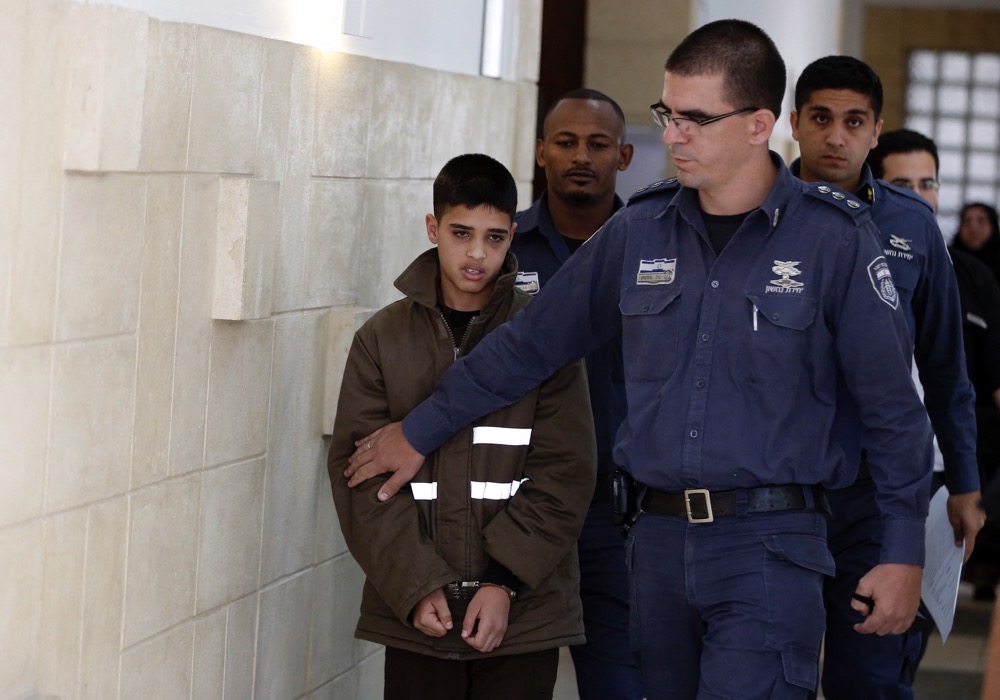
Ahmed Manasra was accused of taking part in the stabbing of two Israelis in 2015. (AFP)
“For Daqqah and his family, the last six months in particular were an endless nightmare, during which he was subjected to torture or other ill-treatment, including beatings and humiliation by the Israeli Prison Service, according to his lawyer.
“He was not permitted a phone call with his wife since Oct. 7. His final appeal for parole on humanitarian grounds was rejected by the Israeli Supreme Court, effectively sentencing him to die behind bars.”
Even when Daqqah was on his deathbed, “Israeli authorities continued to display chilling levels of cruelty … not only denying him adequate medical treatment and suitable food, but also preventing him from saying a final goodbye to his wife Sanaa Salameh and their 4-year-old daughter Milad,” Guevara-Rosas said.
Milad was the couple’s small miracle. When they were denied the privilege of conjugal rights, their child was conceived after a unique prison “breakout” — her father’s sperm was smuggled out of prison.
He was, however, only allowed to see his daughter once in person, in October 2022, and even then only after “a daunting legal battle.”
Worse, his wife, Sanaa Salameh, “who tirelessly campaigned for his release, could not embrace her dying husband one last time before he passed,” Guevara-Rosas said.
In death, Daqqah will live on in the collective memory of his people as one of the million or more Arab citizens imprisoned by Israel since 1948 and whose incarceration has been commemorated every year since 1974 on April 17 as Palestinian Prisoners’ Day.

the Ofer military prison located between Ramallah and Baytunia in the occupied West Bank. (AFP)
This year, there are more Palestinian prisoners in Israeli prisons than ever before.
According to figures released by the Israel Prison Service, as of this month, Israel is holding 9,312 “security inmates” in jails under its jurisdiction, including Ofer Prison in the West Bank.
That figure does not include the thousands of Palestinians detained by the Israeli military in the Gaza Strip, who are believed to be held incommunicado in military camps, including the Sde Teiman base in the desert.
On April 4 a group of nongovernmental organizations including the Committee Against Torture wrote to Israel’s Military Advocate General demanding the immediate closure of the facility. They cited the testimonies of innocent Palestinians who had been released from the camp who painted “a horrifying picture of inhumane prison conditions, humiliation and torture.”
The detainees, they said, “are held in a kind of cage, crowded, sitting on their knees in a painful position for many hours every day. They are handcuffed at all hours of the day and blindfolded. This is how they eat, relieve themselves and receive medical care.”
Even without this unknown number of detainees, the 9,312 prisoners acknowledged by the IPS is a record, beating even the previous highest number, established during the Gaza War of 2008-09.
Of these, just 2,071 have been tried and sentenced. A further 3,661 are what are euphemistically termed “administrative detainees” who have not been charged, tried or found guilty of any offense.
According to B’Tselem, the Israeli Information Center for Human Rights in the Occupied Territories, administrative detention is when “a person is held without trial, without having committed an offense, on the grounds that he or she plans to break the law in the future.”
The tactic is disturbingly reminiscent of the 2002 science fiction film “Minority Report,” in which police arrest people for crimes that psychic “precogs” predict they might commit.
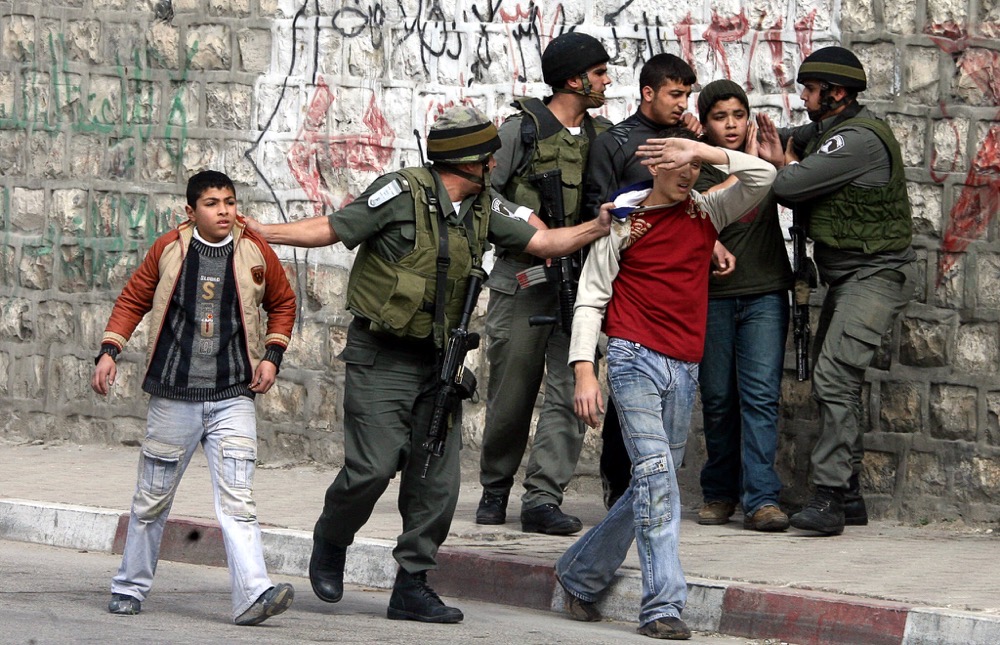
Israeli soldiers arrest Palestinian youth during an incursion in the West bank town of Nablus in 2007. (AFP)
Amnesty said it was a particularly invidious legal device under which military authorities “may place individuals in administrative detention for up to six months at a time, if the commander has ‘reasonable grounds to believe that reasons of regional security or public security require that a certain person be held in detention.’”
The order may be extended for an additional six-month period “from time to time” and there is no time limit to administrative detention.
“The person is detained without legal proceedings, by order of the regional military commander, based on classified evidence that is not revealed to them.
“This leaves the detainees helpless — facing unknown allegations with no way to disprove them, not knowing when they will be released and without being charged, tried or convicted.”
A smaller but significant number of residents from the Gaza Strip — 849 — are being held under Israel’s controversial Incarceration of Unlawful Combatants Law, which was introduced in 2002 and also allows arbitrary detention without trial.
Amnesty said the official figure was doubtless wide of the mark.
“We know there are thousands of Palestinians from Gaza held arbitrarily under said unlawful law for weeks and months on end,” a spokesperson told Arab News.
For many, incarceration is just the beginning of the nightmare.
“Palestinian detainees and prisoners have been subjected to gruesome levels of inhumane treatment that reached unprecedented levels of cruelty as part of the Israeli authorities’ retaliation campaign against Palestinians following Oct. 7,” Waed Abbas, a research and campaigns officer at Amnesty’s regional office in Ramallah and Jerusalem, told Arab News.
Drawing on the testimonies of Palestinians who have been released from prison and detention, and evidence gleaned through rarely allowed visits by lawyers, Amnesty said “a chilling image of a terrifying reality” was emerging.
“They’ve been tortured, starved, denied adequate medical care, cut off from the outside world, including from their families, put in solitary confinement, humiliated and degraded,” Abbas said.
The use of torture, she said, “has witnessed a spine-chilling spike and at least 40 Palestinian prisoners and detainees have died in Israeli custody over the past six months, either in military detention centers or in prisons run by the Israel Prison Service.”
And this is only the number of deaths officially acknowledged by the Israeli authorities. “The actual death toll may yet be higher,” Abbas said.
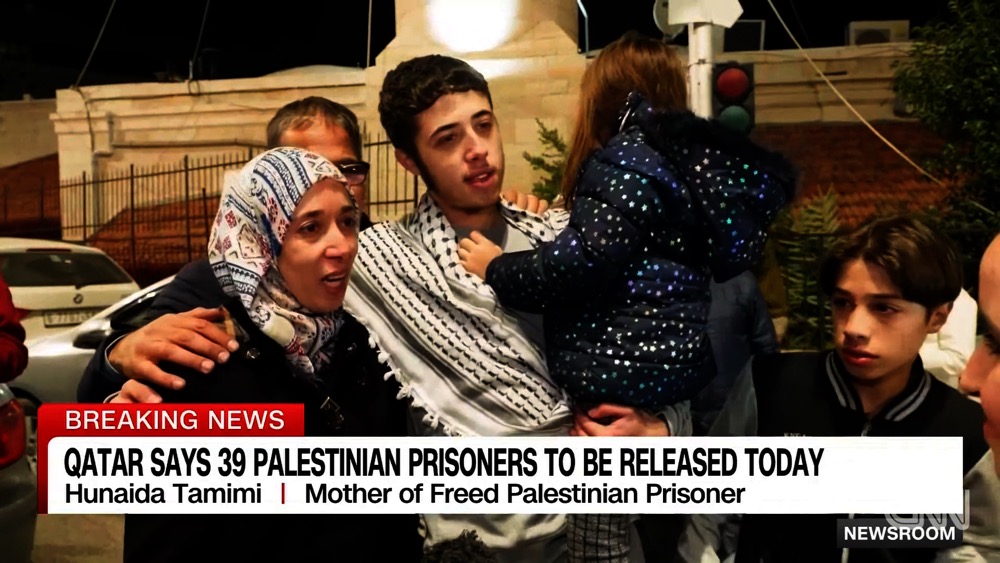
Wissam Tamimi, 17, reunited with his mother Hunaida and his younger brother and sister. (CNN videograb)
In many cases, the imprisonment of individuals has continued even after their death. “Families have been denied the right to mourn them with peace and dignity as Israel continues to withhold their bodies.”
Noa Sattath, executive director of the Association for Civil Rights in Israel, said the deteriorating conditions facing Palestinians in Israeli prisons was of “grave concern.”
Recent policy changes instigated by the IPS following an order by Itamar Ben-Gvir, Israel’s right-wing minister of national security, “have resulted in the arbitrary denial of basic rights, including access to medical care and legal counsel,” he told Arab News.
ACRI had petitioned Israel’s Supreme Court, protesting against “the policy of starving security prisoners, highlighting testimonies of extreme hunger and poor food quality among detainees,” and also called for the immediate resumption of Red Cross visits to Palestinian detainees.
“Even, and perhaps especially, amid conflicts and hostage situations, upholding detainees’ rights remains imperative for ensuring justice and dignity for all,” Sattah said.
For Miriam Azem, international advocacy and communications associate at Adalah, the Legal Center for Arab Minority Rights in Israel, the extent to which the wider world is turning a blind eye to Israel’s abuse of human rights and legal norms is shocking.
“To be frank, this has gone under the radar, in terms of both the mainstream global media and most of the Western world, including the UN,” she said.
In a bid to put the issue on the global agenda, on Feb. 19, four NGOs, including Adalah and Physicians for Human Rights Israel, submitted a joint plea for action to Dr Alice Edwards, the UN special rapporteur on torture, drawing her attention to the “marked and severe escalation in the abuse of Palestinian detainees and prisoners incarcerated in Israeli prisons and detention facilities” since Oct. 7.
Among other things, the signatories urged Edwards to “call on Israel to immediately halt the systematic abuse, torture and ill-treatment inflicted upon Palestinian prisoners and detainees,” to ensure that “all persons deprived of liberty are afforded all legal safeguards from the very outset” and guarantee adequate medical care generally and “specifically for victims of abuse, torture and ill-treatment.”
As part of the appeal the NGOs documented 19 “very concrete” cases backed by “substantive evidence and testimonies of torture and ill treatment.”
The dossier makes for disturbing reading.
“Prisoner A,” released from Gilboa Prison, and other inmates “were subjected to beatings in their cells (and) were forced to curse themselves and to crawl while carrying an Israeli flag on their back and were threatened with beatings if they failed to do so.”

A Palestinian prisoner hugs his mother after being released from an Israeli jail in exchange for Israeli hostages released by Hamas from the Gaza Strip last year. (AFP)
Throughout Detainee E’s detention in the Russian Compound Detention Center in Jerusalem between Oct. 29 and Nov. 12, 2023, “he was beaten on four occasions by wardens, including kicking, punching and the use of batons.”
In a hearing at Judea Military Court on Nov. 13, “female detainee A’s attorney reported that A had sustained repeated abuse; among other incidents, wardens had beaten A in her cell, without cameras, while she was naked.”
Two days later, at a hearing at Haifa District Court, it was reported that another female detainee from Hasharon Prison “had been threatened with rape and bodily assault.”
Several of the highlighted cases documented in distressing detail incidents of sexual abuse and daily violence suffered by male prisoners in Ketziot Prison.
Azem said that given the difficulties of collecting evidence, the 19 submitted cases were merely a representative sample of a far larger problem.
“One of the themes we have highlighted in the document is that prisoners face extreme threats of reprisals for speaking out.”
On March 8, the UN rapporteur said she was investigating the allegations of torture and mistreatment of Palestinian detainees in Israel and was in talks to visit the country.
In a statement to Reuters, the UN human rights office said it had received “numerous reports of mass detention, ill-treatment and enforced disappearance of Palestinians in northern Gaza by the Israeli military and has recorded the arrests of thousands in the West Bank.”
Responding to the allegations in a statement to AFP, a spokesperson for the Israel Prison Service said: “All prisoners are detained according to the law.”
It said the service was “not aware of the claims” against it, but stressed that any complaints filed by detainees “will be fully examined and addressed by official authorities.”
In many ways the life and death of Walid Daqqah symbolizes the wider suffering of the tens of thousands of men, women and children who have followed him into Israeli custody over the almost four decades since he was first incarcerated.
How he lived his limited life behind bars, however, lives on as an example of how hope can survive in even the most seemingly hopeless of circumstances.
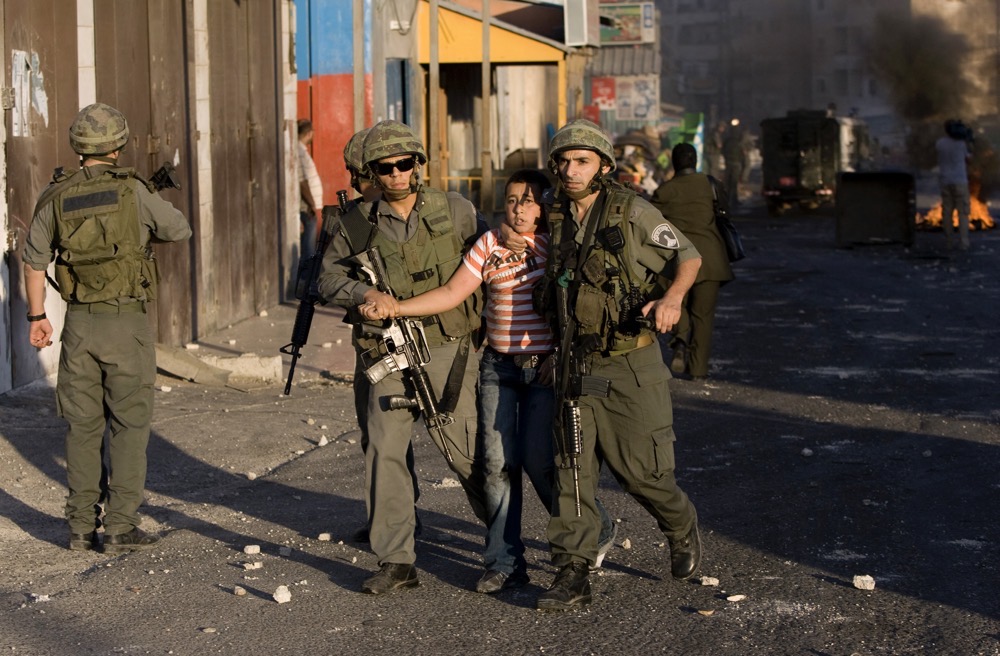
Israeli border policemen detain a Palestinian stone-throwing youth during clashes on October 5, 2009 in the east Jerusalem Shuafat refugee camp. (AFP)
In an obituary published on April 8, the day after his death, Amnesty said that while behind bars Daqqah “wrote extensively about the Palestinian experience in Israeli prisons.”
“He acted as a mentor and educator for generations of young Palestinian prisoners, including children,” it said.
“His writings, which included letters, essays, a celebrated play and a novel for young adults, were an act of resistance against the dehumanization of Palestinian prisoners.”
A line he once wrote shines as a beacon of hope for the tens of thousands of Palestinians who since 1986 have followed him into captivity: “Love is my modest and only victory against my jailer.”
